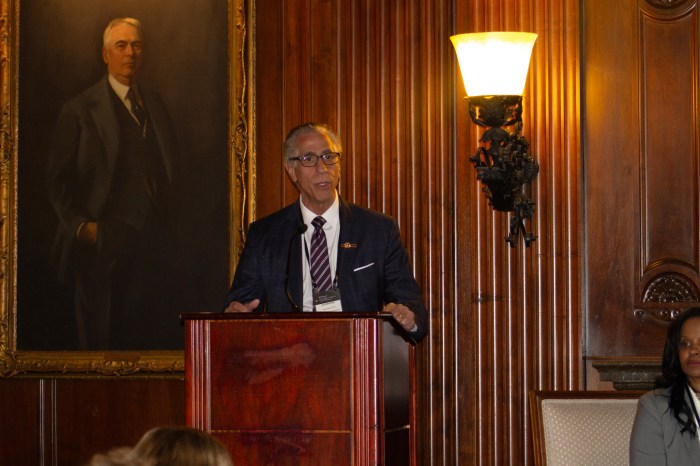Defeat of non-partisan effort, Letitia James victory widely cheered
A number of leading gay and lesbian political leaders and organizations came out on the winning side of the two highest visibility contests in an otherwise subdued off-year city election on Tuesday.
By a margin of more than two to one, voters rejected a revision in the city’s charter that would have eliminated political party primary elections in choosing officeholders from city councilmembers to mayor. The charter change had been a top priority of Republican Mayor Michael Bloomberg since his 2001 campaign, and his loss on the issue, which he is widely reported to have spent more than $2 million of his own money promoting, is a strong blow to his prestige.
All three of the city’s out gay and lesbian councilmembers—Democrats Margarita Lopez of the Lower East Side, Chelsea’s Christine Quinn, and Upper Manhattan’s Philip Reed—were vocal opponents of the Bloomberg plan.
Gay and lesbian political activists, many of whom have worked for years to bring about change within the local Democratic Party, were also widely opposed to the referendum.
Most queer politicos who took sides in the race to fill the vacant 35th City Council district seat vacated by the July 23 murder of Brooklyn’s James Davis were also vindicated by the surprisingly easy triumph of Letitia James, the Working Families candidate, who challenged the Davis family’s hand-picked successor on the Democratic line, James Davis’ younger brother Geoffrey.
Letitia James has long been a Democratic Party insider, having worked for several Democratic assemblymembers, most recently Roger Green. Though Davis enjoyed the official support of the Brooklyn Democratic organization and the endorsement of many city councilmembers, James swept a host of key local Democratic endorsements.
James’ support in the lesbian, gay, bisexual, and transgender (LGBT) community mirrored the enthusiasm of local Democrats. She was endorsed by the Lambda Independent Democrats, Brooklyn’s influential queer club, the Empire State Pride Agenda, the state gay rights lobbying group, and the Out People of Color Political Action Club. Councilmember Quinn was also a strong James backer.
The 35th district includes several neighborhoods with vibrant LGBT communities, including Fort Greene, Clinton Hill, and Prospect Heights, and James and Davis both signaled their interest in wooing votes there. The two candidates appeared at LGBT forums and, in answering election questionnaires, vied to outdo each other in their support for queer political goals.
But, as an appearance in front Lambda demonstrated, James was more conversant with the details of specific policy initiatives, both on gay issues and generally. In an interview with Gay City News, James spoke out against state Senator Ruben Diaz for his lawsuit challenging the use of city money to run Harvey Milk High School.
Despite repeated efforts by this newspaper, Davis did not make himself available for an interview.
Davis’ vagueness on policy issues on the stump amplified doubts about his candidacy that emerged in the days after his brother’s death. Despite reports of a conviction on solicitation of prostitution charges and allegations that he has failed to pay child support, Davis declined to address these issues in detail, insisting simply that he had turned over a new leaf. James’ margin of victory—more than four to one—suggests that Davis early on squandered the good will left by his brother’s tragic death.
The term squander, however, will even more readily attach itself to Bloomberg when the history of this year’s election is written. Even as the mayor was spending vast sums out of his pocket on the failed referendum initiative, he was stubbornly refusing to have his name printed on the glossy brochures blanketing voters’ mailboxes, a point that became a lightning rod for Democratic criticism.
In an October meeting with Manhattan newspaper reporters that Gifford Miller called to denounce the non-partisan effort, the speaker took pains to emphasize that the vote was not a referendum on Bloomberg’s performance. But in the wake of Tuesday’s vote, many pundits said it was exactly that, with more than one in the LGBT community adding that it was also a big boost for Miller, who oversaw a campaign in which every Council incumbent won reelection.
“I certainly think that it hurts the mayor,” said Reed, who has already signaled his intention of seeking the Manhattan borough presidency in 2005. “People who were thinking about running against him see how vulnerable he is, how his millions didn’t buy him what he wanted.”
Reed predicted that the outcome this week would “strengthen the hand” of the Council in areas of contention it has with the mayor.
When asked whether Miller has been helped in his likely bid for the Democratic mayoral nomination in 2005, Reed answered, “Absolutely.”
Charles King, a top official at Housing Works, an AIDS service organization, agreed with Reed’s overall handicapping, but noted that Miller is not the only Democrat likely cheered by the results.
“Giff is certainly not going to be the only candidates out there,” he said.
King argued that that the key question is whether Bloomberg “has learned anything from this… His arrogant style was a big part of what happened yesterday.”
King pointed to what he termed the mayor’s unilateral approach on a range of issues, and specifically recalled Bloom-berg’s recent action in shifting the Mayor Office of AIDS Policy into the Department of Health, a move many advocates faulted for ending a tradition of independence in that office from the city’s bureaucracy. King said he hoped that the mayor’s weakened posture would encourage councilmembers to step up on Housing Works’ proposal to create a new independent AIDS policy office, an idea he said both Miller and Quinn had voiced an interest in, but not yet taken any concrete steps on.
Jennifer Flynn, who heads up the New York City AIDS Housing Network, also voiced hope that the election results would force Bloomberg to be more consultative in his leadership. She argued that a housing program promising 65,000 units of new housing that the mayor announced last year has foundered largely because he failed to elicit meaningful community input before announcing it.
Brad Hoylman, president of the Gay and Lesbian Independent Democrats, which campaigned hard to defeat the non-partisan initiative, said he hopes Tuesday’s results will strengthen the Council’s hand in securing passage of the Equal Benefits Bill (EBB), a measure sponsored by Quinn that would force major contractors doing business with the city to offer their employees’ domestic partners the same benefits given spouses. A hearing on the bill, for which Quinn says she has veto-proof support in the Council, is slated for later this month. Hoylman said he also hopes for more action on AIDS, homelessness, and women’s and youth services.
Joe Tarver, a spokesperson for the Pride Agenda, which did not take a position on the non-partisan referendum, also expressed hope that this week’s elections would add momentum to the push for the EBB. He added, however, “The mayor is still the mayor. His veto is just as strong today as it was yesterday, and we hope to get him on board on this bill.”


































